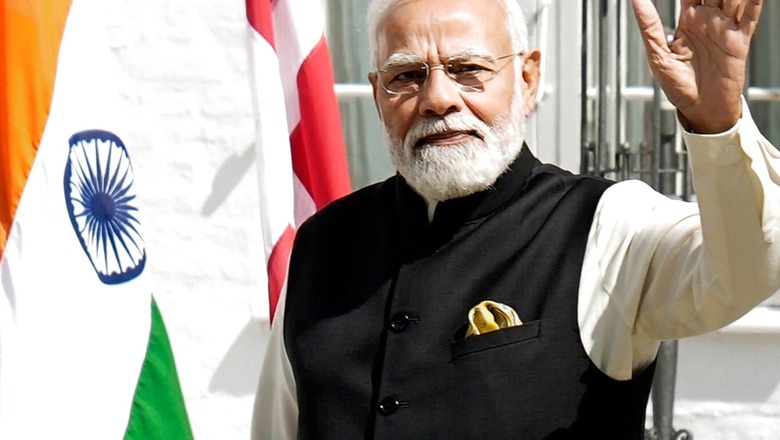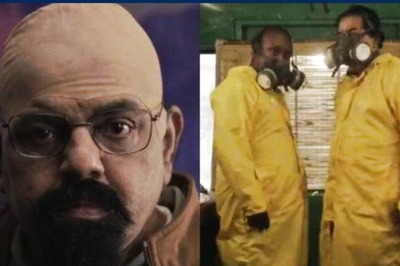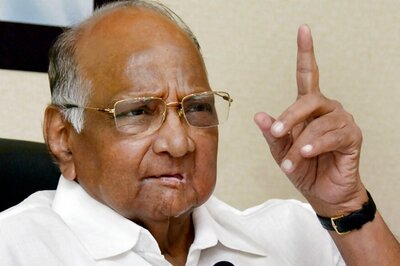
views
Today, as we celebrate Modi@8, we can clearly see the transformation that India has undergone. When Prime Minister Narendra Modi contested the elections in 2014 on the twin principles of growth and development, there was enormous amount of enthusiasm and excitement in the country. He came to power with a thumping majority.
India was coming out of five bad years of the UPA government, which were marred by corruption and an inability to build upon the accomplishments of UPA-1. The ugly politics of corruption and division, and a PM who was not demonstrating leadership were there for all to see.
India was looking forward to a new model and PM Modi has since given us strong leadership, globally as well as within the country, by taking all the tough decisions required to put India on a high growth path.
Feathers in Modi’s Cap
In the area of business, GST, the Insolvency and Bankruptcy Code, demonetisation, drive against black money, checking crony capitalism, elimination of corruption in government contracts, especially in defence, launching the Atmanirbhar programme for the Indian industry and giving them the kind of benefits that companies get in the US, the PLI programme for manufacturers have pushed the Indian industry forward.
PM Modi has also demonstrated that the Indian industry does not have to lobby in New Delhi. On August 15, 2015, the PM spoke of Digital India, Stand Up India and Start-up India. While most wondered what this was about, he clearly knew that he was putting India on a different growth path.
The Aadhaar programme, the Direct Benefit Transfer (DBT) programme, which has led to nearly Rs 23 lakh crore being directed towards beneficiary accounts without any loss in between, with 45 cror new banks accounts opened, the UPI programme with 10B transactions and 10 lakh crore-plus transfers monthly, which is now the world’s largest, are clear demonstrations of PM Modi’s vision.
He also ensured that the Rs 10,000 crore start-up fund managed by SIDBI (Small Industries Development Bank of India) is set up, which in turn has given rise to multiple new fund managers across India. Today, the startup ecosystem with over 70,000 start-ups, 100 Unicorns and creating $500 billion of value employs nearly 15 lakh people. It is clearly the beneficiary of Modi’s vision of Start-Up India. The fact that he recognises India’s young entrepreneurs, meets them multiple times, makes heroes out of them, listens to them and brings in policy changes, is a testimony to his vision. Digital India, Startup India, Stand Up India have fundamentally transformed entrepreneurship in this country.
In the social sector, Narendra Modi has done more than any prime minister in Independent India to tackle the challenges of poverty. The Prime Minister has ensured in the last eight years that almost every Indian has a roof over their head, water in the tap, power in the switch, a toilet in their house, a gas stove, a bank account and money in the bank account, an internet connection, food on the table, health insurance, and education for their children and a good road to every village. His direct transfer to small farmers of Rs 6,000 per year, increase in farmers’ income by better policies has fundamentally changed their lives. His social security policies of life, health insurance, pension schemes have secured people’s lives. He has vastly expanded the higher education capacity through state intervention so that more people can have access to quality higher education.
He has ensured health for all through his massive health insurance programme under which majority of people can get their health issues resolved without incurring high cost. He has also made sure that corruption in the system is stemmed — over Rs 2 lakh crore has been saved under the DBT programme by plugging leakages. Delhi has been purged of corruption in defence and government deals.
In foreign affairs too, we have seen a radical change in the way the world treats us. In the earlier UPA era, India was seen as a weak global player that could be pushed around by a major one.
PM Modi has put Pakistan in their place by refusing to deal with them because of Islamabad’s insistence on using terrorism as an instrument of state policy. Today, Pakistan is witnessing high inflation, a breakdown of law and order, with the terror policies coming back to bite them. We have also seen how the FATF (Financial Action Task Force) has continued to place Pakistan on the grey list for terror funding.
The Prime Minister has stood up to China and Chinese aggression along the LAC. In doing so, he has sent a message to the world that India will protect her borders at all costs.
He has brought in an India First policy in defence-related purchase by making sure that the Indian Army is well-provisioned and has access to the latest equipment. This, along with an Indian-first manufacturing policy, to make sure that Indian companies manufacture majority of the defence products required by the Indian Army (currently at 65%); a reduction in dependence on foreign sources; and an elimination of the ‘middleman corruption nexus’ in New Delhi defence purchases.
His bold moves to ensure Indian defence gets its due has made sure that we have a strong defence force – India is now viewed as a world power, especially by the Quad, with the US declaring that the Pacific Command will now be known as the Indo-Pacific Command.
The Middle East has become India’s friend after being supporters of Pakistan for 60 years, with many countries in the region honouring PM Modi with their top national honour, an unprecedented accomplishment for any global leader.
His outreach to India’s immediate neighbours to create goodwill has made them India’s friends. The antagonistic policies of our earlier rulers has now given way to a much more congenial policy.
The Prime Minister has built bridges with Japan and Southeast Asian countries at the highest level. Indeed, across the world, India is today looked at with respect and as a strong regional power.
PM Modi has made sure that the Indian foreign policy works on an ‘India First’ basis and is not subservient to any lobby or country. He has also stood up to the West over the Ukraine conflict and told them clearly that India’s national interest will always come first, and she will not join any bloc in their inter-regional politics.
Even while dealing with the states, he has made sure that they get their money on time. In the recent budget, old arrears on devolution of taxes were cleared; his policies to enhance tax collection have borne fruit. In the last year, tax collections were up by Rs 5 lakh crore, an unprecedented achievement for any government in independent India’s history. Overall, one must say the Prime Minister has done extremely well.
PM Modi has done remarkable work in the infrastructural area, building highways, ports, railways and airports. Today, India has a remarkable highway network across the country facilitating fast transport movement. Trains are now running at an average speed of 45 km per hour as against 25 km per hour earlier. Huge investments have been made in Railways, roadways and ports. It is very important for India to be productive and efficient; supply chain costs which were 14% of the GDP have come down to 10%; 17 different taxes have been eliminated in the GST, besides elimination of check-posts at state borders. But, we need to bring the supply chain costs to 7-8% of the GDP – it can be achieved through a top-class, highly efficient and low-cost transport system. The huge tax collection at toll gates should not become a burden on rapid transportation.
We have seen a sea change in the supply chain situation in the country, for which full credit must be given to PM Modi. The massive expansion in the road and rail infrastructure in the Northeast, in Jammu and Kashmir and in underserved areas shows that entire country will soon be connected by a very efficient system of national highways, roadways and railways.
Room for Improvement
However, there are some areas, which have suffered due to inadequate action, and Prime Minister Modi must look at them in the remaining two years of his government’s second term.
The biggest failure of the Indian democracy has been the failure of the justice system. Guarantee of justice in the Preamble and in the Constitution of India has not been fulfilled in the last 75 years. More than 4.5 crore cases are pending in courts. Cases in India on an average run for 15-20 years. The poor, women and other disadvantaged sections of the society bear maximum brunt of the long delay in delivery of justice.
The fundamental challenge has been inadequate capacity. We only have 18 judges per million people whereas we require a minimum of 50. The US has a minimum of 100 judges per million population. We need a justice system that can deliver justice in 2-3 years. Unless speedy justice is delivered, India cannot move forward as a republic, which was founded on the principle of justice.
We have seen tax terrorism double in the last seven years. When the NDA government came to power, Arun Jaitley, then finance minister, promised to rein in tax terrorism. India had nearly Rs 4.5 lakh crore tied up in tax cases then; today, that amount has gone up to nearly Rs 12 lakh crore. Tax authorities have got more powers in the last eight years to oppress and suppress taxpayers rather than help create a tax -compliant culture. Sadly, taxes have increased for honest high taxpayers while many dishonest ones are laughing all the way.
While the black money class has been hurt by demonetisation, the government drive against them, as well as by the Bankruptcy Code, honest taxpayers have seen their tax assessments reopened, scrutiny notices against them getting enhanced, besides getting caught in unnecessary and long tax litigation. Seventy-five per cent of tax litigation cases in the higher courts have been lost by the tax department. Putting an end to tax terrorism should be one of PM Modi’s priority goals along with delivery of justice.
We have also seen an inadequate state capacity in the regulatory area. The National Company Law Tribunal (NCLT) has not been able to finalise cases over a long period, bankruptcy cases seem to continue forever. The RBI does not respond to calls and letters from people who seek approval on several things; the lack of response has led to many start-ups leaving this country and re-domiciling. Over 40-45% of unicorns are domiciled outside India because of uncertainties in tax and the lackadaisical approach of the foreign exchange regulators as well as the RBI. There is fear in business circles about tax terrorism, about the uneven action taken by the RBI in implementing FEMA (Foreign Exchange Management Act). The FERA (Foreign Exchange Regulation Act) mindset is prevalent in the FEMA establishment. The other investigative agencies such as the CBI, ED have become quite active but have not been able to prosecute wrong-doers. They publicise raids, spoil reputation, delay cases but have failed to prosecute speedily. All this has led to more than 10,000 high-net-worth individuals (HNIs) relocating outside India, with many within the industry looking to move overseas. This fear, threats and harassment has to end.
We need radical reforms in this area so that honest business can continue without fear of tax authorities or the RBI. Other regulatory agencies too do not respond in time to requirements or applications from people. All regulatory agencies should set a time limit by which they will respond to applications for permissions, which in turn can accelerate the business. There are more than 65000+ compliances, which need reduction. If business is not compliant, unless there is a criminal mindset, they should be penalised and fined not harassed continuously.
The next big challenges are inadequate capacity in policy making and lack of adequate transparency.
Tax laws in India, for instance, are badly drafted; changes in tax laws can be first put out as drafts to seek public opinion and then implemented so that they are acceptable to all and there is no element of surprise. There is no need for secrecy in tax laws with the GST coming in. There needs to be a greater open consultation with the industry on tax matters.
Even regulatory agencies need greater transparency and inclusiveness. The ministries, too, don’t seem to have enough consultation with the stakeholders. They operate in a manner where the bureaucracy mostly decides the policy as most ministers, despite being the representatives of citizens, do not talk enough with the stakeholders for an advice.
It is, therefore, suggested that every minister should have 8-10 advisors or a group of stakeholders who can be consulted for their opinion on various changes in policy. The minister after having listened to the stakeholders can then look at the bureaucrat’s proposal and decide what changes have to be done and in what manner.
India requires a much more interactive, open and inclusive system of policymaking. State capacity for policymaking has to be considerably enhanced. If India wants to be a $10 trillion economy, we need new better policies and stakeholder consultation, and discussions so that there is no conflict.
On several occasions, we have seen stakeholders being unhappy with the policies or policies not being implemented; all this has to change.
Prime Minister Modi in the remaining two years of his second term has to look at these four issues: lack of justice, tax terrorism, lack of transparency in policymaking, and lack of state capacity in policymaking and bring in radical reforms. The state-citizen relationship has to change from one of ruler-supplicant to a true democratic representative partnership.
Addressing these challenges will take India forward and make it an inclusive country where barriers to expansion of the economy, creation of jobs, and unnecessary compliances are removed.
Because Prime Minister Modi has been such a stupendous performer, expectations from him are much higher than any government in the past 40 years. He should forever be remembered as the Prime Minister who transformed India.
T.V. Mohandas Pai is Chairman, Aarin Capital Partners. The views expressed in this article are those of the author and do not represent the stand of this publication.
Read all the Latest Opinions here




















Comments
0 comment